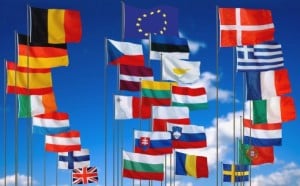
Yesterday evening, I had the privilege of attending two separate speeches, featuring two top diplomats. The first was former U.S. Secretary of State under President Reagan, George P. Schulz; the second was current Greek Foreign Minister, Stavros Lambrinidis. What stood out most to me about the two respective addresses were remarks, concerning current economic and political challenges in Europe. The two men arrived at two very different conclusions – no doubt partly due to the fact that they began at two very different starting points. Secretary Schulz came of age in a period in which there was absolutely no challenge to the centrality of the nation state; he is of course long retired; and his comments represented his own views. Foreign Minister Lambrinidis on the other hand is in the prime of his career – a career which is increasingly defined by the post-national experiment of the European Union (EU); his country is at a major crossroads; and his comments are highly politicized.
The Greek Foreign Minister noted that the EU must become more politically and economically united, lamenting the undermining of “the power of 500 million Europeans,” because they do not issue joint bonds. While the 500 million figure may have simply been for effect (the combined population of the seventeen Eurozone as opposed to EU countries is of course considerably smaller), Secretary Schulz also noted that further economic integration, most notably in the form of some degree of fiscal harmonization, would have to be an essential piece of pulling Europe out of its current pickle. The former Secretary of State went on, however, to state that in his estimate this seems extremely unlikely, noting that when a country surrenders the ability to determine something as simple as tax rates for its citizens, one must question if the entity can be properly referred to as a sovereign state.
Of course while the one is attempting to paint a hopeful vision for the future and his people as a current leader, the other is offering a sober judgment. Indeed, Schulz repeatedly stressed that the first element of successful policy is that it reflect reality. When one considers the numbers, 500 million Europeans indeed seems like a squandered opportunity – not only in terms of securing the currency through Eurobonds or better leveraging the largest market in the world, but also in terms of defense investments to seize control of Europe’s own security without the United States, or even coming to New York with a unified stance on Palestine’s bid for recognition in the United Nations General Assembly this week.
Reality, however, means no European leader who hopes to be re-elected can take an “economic union” to her or his constituents. At a time when the mood across Europe is more fearful and inward looking than any other in recent memory, this is not politically viable. Heads of European governments go to Brussels offering too little from an EU standpoint, only to return home accused of surrendering too much.
Secretary Schulz’s query of when a state ceases to remain sovereign is also a salient one in this situation – one with serious implications in terms of identity for 500 million. We need not look any further than Greece and its dispute with the Republic of Macedonia or FYROM as the case may be (a question about which the Greek Foreign Minister briefly responded to yesterday evening) to see how central questions of identity can be in Europe.
And if I can infuse my own conclusions from a third and surely more modest starting point, there is not a country in Europe, which is prepared to relinquish further, significant sovereignty, which would take them across a line to an area where it is not clear whether they remain a sovereign state. Their people are not ready for it. Having spent years living, studying, and working in various European countries, I have befriended and discussed with (now recently former) European exchange students and young professionals from every EU country. Not one of these individuals – the most progressive of young, enlightened EU citizen-students, living out the ideal of European integration through the ERASMUS Programme identifies as a European first and an Austrian, Bulgarian, Finn, Spaniard or whatever the case may be second. How is this working out on smaller, long-established levels in the case of ethnically and linguistically unique groups in Belgium? The Basques? Ethnic Hungarians in Slovakia? Even the various regions of Italy? This is to completely ignore the Balkans. How many generations will it take for ERASMUS students to feel European; how many more for the butchers, bakers and candlestick makers; and how many months can the Eurozone wait?